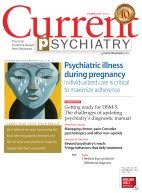Gary E. Miller, MD
Clinical professor of psychiatry, University of Texas Health Science Center, Houston, TX
Richard L. Noel, MD
Assistant clinical professor of psychiatry, University of Texas Health Science Center, Houston, TX
Today’s buzzword in health care is evidence-based medicine. Most clinicians would agree that evidence from clinical research should guide decisions about treating bipolar disorder. In theory, randomized controlled trials should tell us how to manage bipolar patients and achieve therapeutic success. But good theory does not always translate to good practice; many patients with bipolar disorder have poor outcomes, even when clinicians adhere to research-derived evidence.
The problem is that one well-designed study’s conclusions may contradict those of another equally well-designed study because of differences in subject selection, comorbidities, dosages, outcome criteria, and other variables. As a result, bipolar experts often disagree about issues as basic as antidepressants’ role in often disagree about issues as basic as antidepressants’ role in managing bipolar disorder and whether recurrent major depression should be considered a form of bipolar disorder. This leaves the clinician with the task of interpreting not only conflicting research findings but also conflicting expert opinion.
This article conveys clinical impressions gained from treating approximately 10,000 patients with bipolar disorder over 16 years. We do not claim to have resolved the issues in dispute, but we hope our experience will help practicing clinicians. We examine the evidence and address controversies in bipolar disorder—such as subthreshold hypomania, manic switches, use order—such as subthreshold hypomania, manic switches, use of antidepressants, juvenile depression/bipolar disorder, and atypical depression—together with our opinions on each.
Read full text (free access)Comment on this article
Email the editor


No comments:
Post a Comment